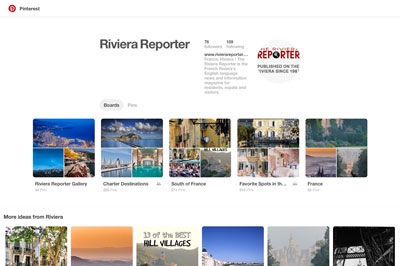Laura Ciocan offers a new take on an old privilege
 That Monaco is crowded with celebrities is no piece of news. Since 1869, when the personal income tax policy became favorable, Monaco attracted very many individuals with high net income, such as movie stars, sporting stars etc. who became residents of the Principality in order to benefit from personal income tax exemption.
That Monaco is crowded with celebrities is no piece of news. Since 1869, when the personal income tax policy became favorable, Monaco attracted very many individuals with high net income, such as movie stars, sporting stars etc. who became residents of the Principality in order to benefit from personal income tax exemption.
Take, for instance, Roger Moore, Shirley Bassey, Ringo Starr, Karen Mulder, Eva Herzigova, the race drivers Jacques Villeneuve, David Coulthard, Jenson Button.
But the number of celebrities is far outnumbered by the number of business people who enjoy the country's tax facilities: the retail tycoon Philip Green and the Barclay brothers are Monegasque residents.
Being a resident of Monaco implies proving you have a place to live and are rich enough to afford a very high standard way of life. And I mean really rich, as a place to live in the apartment blocks jammed into two square kilometres, either rented or bought, is extremely high.
Keeping residency implies proving you live in Monaco at least 6 months and a day per year. If you are rich, the advantage of being a Monaco resident is that, besides enjoying a sunny, pleasant climate, you can live at the same time in another country. The Principality is very close to main airports and is also easily reachable by sea, by car or by train. Thus, being a Monaco resident and working in another country is not only possible but it's easy especially speaking of UK citizens: laws in UK permit a maximum stay of 90 days (without counting the day of departure and that of arrival!) for non-residents. Many UK business people reside in Monaco and work in the UK without surpassing the 90 days limit so that they are subject to Monaco lawas for taxation.
Having attracted so many rich resulted in a conflict of interests: many countries disapprove of this taxation policy, looking at it as an evasion from taxes in their national area. And not entirely wrongly! In fact, Monaco has been "tax-cheating" a little by attracting capital from the high tax countries.
Looking at the issue from the perspective of the Principality, seems to me only right to try and succeed to evolve with the few means and resources a state so small has. Monaco developed from one of the poorest countries in the world (in the 1860s) into a state with one of the world's highest per capita income (around EUR22,000). And it was possible due to a strategic leadership of a resourceless country. It is after the territory was drastically reduced that this personal income tax policy came into being. Attracting foreign capital become one of the main targets for development. That's how the Casino became grand and famous and emphasis was put on tourism, being raised at luxury levels.
After the individual taxation regulations, in 1963 the Principality came with another financial artifice: no tax for local company profits or dividends. Thus the target was to enhance local business flourishing. This stipulation combined with an almost hermetic data privacy did nothing else than to increase even more foreign investments in Monaco.
So, from the point of view of big economic powers, Monaco should be punished, and so deserves any country daring to offer a better taxation alternative, putting at a disadvantage their high-tax based economy. The OECD has a project on "harmful tax practices" stipulating a set of punitive measures for the non-cooperating jurisdictions.
Invoking money laundering and international terrorism tracking, many OECD governments promote a policy of free information exchange that has as main purpose limiting the tax competition, beyond the intention to limit tax evasion and to combat serious crime.
Estimated negative results of OECD policy:
* Eliminating tax competition would result in uniformizing taxes to the amount dictated by some governments. Without the possibility of choosing a better alternative, there is no reason for governments to reduce taxes and make the tax system more efficient.
* This policy would change the present status of emigrants that pay taxes only to their new country and would promote the premise that the state still has a right to benefit from its former national labour. This sounds to me like a violation of fundamental human rights.
Although in 2004 still on the OECD black list of the tax policy non-cooperating jurisdictions, Monaco has changed its policy regarding the high confidentiality of financial data in the light of the expected, recent admission to the Council of Europe (Monaco joined the Europe Council on October 5, 2004 ). Modifications to legislation:
* October 2001: French citizens living in Monaco since 1989 must pay a wealth tax beginning with 2002.
* Information on French nationals are to be unconditionally provided to the Bank of France when required. Information may be passed on to the authorities of France or of a third country if necessary.
* 2004: Under EU's Savings Tax Directive, Monaco will impose a witholding tax on the returns on savings such as bank interests earned by EU citizens. The tax quantum will be the same as in Austria, Belgium and Luxembourg (initially 15%). 75% of such revenues will be handed over to the Member State of the respective EU resident. This will be applied beginning with 2005.
* December 2000: Monaco signs the United Nations Convention Against Transnational Organised Crime. The treaty stipulates that its members do not permit anonymous accounts requiring identification of customers. Banks must keep accurate records of accounts and report any suspicious transaction. Moreover, the domestic law enforcement officials are permitted inspection of accounts.
With all these measures, it seems that Monaco's attraction as a personal income tax haven will decrease. It remans to be seen how all these measures will affect Monaco financial and banking system after becoming operative.
Laura Ciocan writes for http://www.ilovemontecarlo.com where you can find more information about Monte Carlo.

















